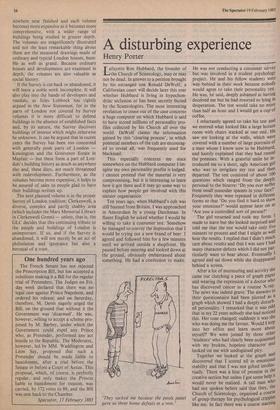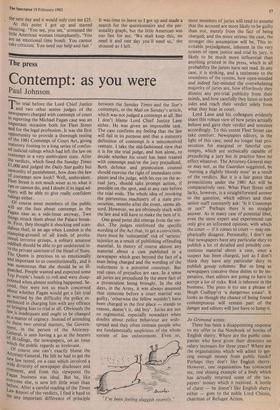A disturbing experience
Henry Porter
Lafayette Ron Hubbard, the founder of the Church of Scientology, may or may not be dead. In answer to a petition brought by his estranged son Ronald DeWolf, a Californian court will decide later this year whether Hubbard is living in hypochon- driac seclusion or has been secretly buried by the Scientologists. The most interesting revelation to come out of the case concerns a huge computer on which Hubbard is said to have stored millions of personality pro- files collected by his Church all over the world. DeWolf claims the information gained by this 'clearing process', in which potential members of the cult are encourag- ed to reveal all, was frequently used for blackmail.
This especially concerns me since somewhere on the Hubbard computer I im- agine my own personality profile is lodged. I cannot pretend that the material is very compromising, but it is interesting to learn how it got there and it may go some way to explain how people get involved with this sinister organisation.
Ten years ago, when Hubbard's cult was still banned from Britain, I was approached in Amsterdam by a young Dutchman. In fluent English he asked whether I would be willing to take a consumer test. Somehow he managed to convey the impression that I would be trying out a new brand of beer. I agreed and followed him for a few minutes until we arrived outside a shopfront. He paused before entering and looked down at the ground, obviously embarrassed about something. He had a confession to make.
'They sacked me because the pools panel gave us three home defeats in a row.'
He was not conducting a consumer survey but was involved in a student psychologY project. He and his fellow students were way behind in their work because nobody would agree to take their personality test. He was, he said, deeply ashamed at having deceived me but he had resorted to lying in desperation. The test would take no more than half an hour and I would get a cup of coffee.
I reluctantly agreed to take his test and we entered what looked like a large lecture room with chairs stacked at one end. He saw me looking at the walls, which were covered with a number of large portraits of a man whom I know now to be Hubbard, and hastily explained that they had rented the premises. With a grateful smile he in- troduced me to a short, ugly American girl who was to invigilate my test and then departed. The test consisted of about 100 questions which ranged from the deeply personal to the bizarre: 'Do you ever suffer from small muscular spasms in your face?' Frequently they were repeated in different forms so that `Do you find it hard to show your emotions?' would appear later on as `Are you a controlled sort of person?'
The girl returned and took my form. I made to leave but she looked surprised and told me that the test would take only five minutes to process and that I might as well hear the results. I replied that I didn't much care about results and that I was sure I had many character defects which I did not par- ticularly want to hear about. Eventually I agreed and sat down while she disappeared behind a screen.
After a lot of murmuring and activity she came out clutching a piece of graph paper and wearing the expression of a doctor who has discovered cancer in a routine X-ray. The news was indeed grave. The answers to their questionnaire had been plotted as a graph which showed I had a deeply disturb- ed personality. I remarked that it was odd that in my 22 years nobody else had noticed this. Her tone changed; suddenly it was she who was doing me the favour. Would I step into her office and learn more about myself? We were joined by three other `students' who had clearly been acquainted with my broken, hopelesS character and looked on me with undisguised pity. Together we looked at the graph and discovered that I scored nil in emotional stability and that I was not gifted intellec- tually. There was a hint of promise in the creative section but unless I got some help it would never be realised. A tall man wh° had not spoken before said that they, the Church of Scientology, organised a course of group therapy for psychological cripples like me. In fact there was a course starting
the next day and it would only cost me £25.
At this point I got up and started shouting. `You see, you see,' screamed the little American woman triumphantly, 'You are an emotional time bomb. You cannot take criticism. You need our help and fast.'
It was time to leave so 1 got up and made a snatch for the questionnaire and the per- sonality graph, but the little American was too fast for me. 'We shall keep this, we need it and one day you'll need us,' she shouted as I left.







































 Previous page
Previous page